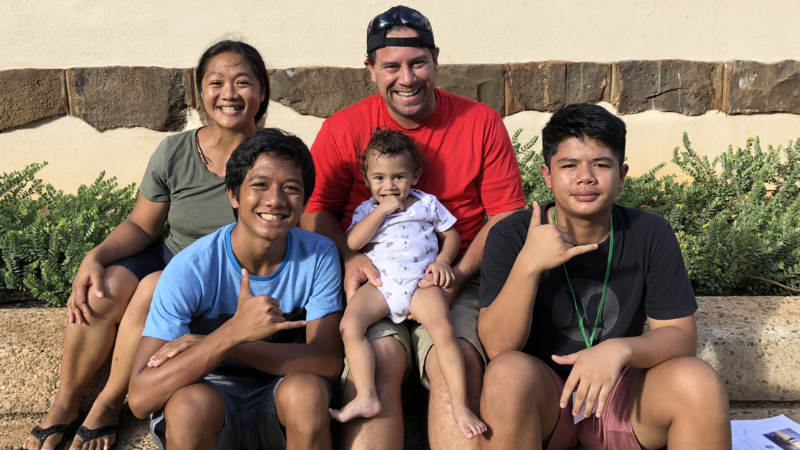Comfort that comes from community: Parents find support for PFD from peers who experienced it
Published by Feeding Matters on May 19, 2023
Despite the joy that comes with parenting, it can also feel incredibly lonesome. That journey is even more isolating for parents of children with pediatric feeding disorder (PFD) who don’t follow the typical feeding and developmental trajectory.
That’s what makes Power of Two, Feeding Matters’ matchmaking program to support parents with one-on-one mentors, so vital. Having a friend to call, text or video conference away makes parenting a child with PFD much less isolating and a bit easier. Paula Benzing, a mom of three in Mesa, Arizona who has two children with PFD, says, “When I was struggling with feeling alone, it helped so much to talk to a coach who understood what I was going through and could just listen to me vent and air my frustrations.”
 There are three main goals for Power of Two:
There are three main goals for Power of Two:
- Decrease feelings of isolation that can come with a PFD diagnosis.
- Give confidence back to parents who know their children best.
- Offer education through every step of the journey.
Power of Two launched over a decade ago as an integral part of why Feeding Matter exists. The program informally began with Feeding Matters founder Shannon Goldwater and former CEO Chris Linn when they realized their children had the same provider, GI and feeding therapist. Their mutual support was a balm in the chaos of navigating feeding issues. When Shannon launched Feeding Matters – called P.O.P.S.I.C.L.E. at the time – she knew parent mentorship had to be a key component.
Athena Flicek, a mom of a child with PFD and Programs and Events Manager at Feeding Matters, describes the need for community support from the Power of Two program perfectly. “PFD is overwhelming. It’s a complicated disorder with complicated signs, symptoms and treatments. Having community support has helped me better navigate this disorder. Feeding Matters was built on the foundation of families, it’s in their history, it’s in their DNA.”
Record-breaking number of families asking for help
In 2023, an unprecedented number of parents are reaching out to Feeding Matters for support. Power of Two in its early days had 41 pairs. Today there are nearly 150 and growing. Parents come from countries worldwide, including: the US, Japan, Australia, Portugal and the UK.
Heidi Van der Molen oversees the program and matches pairs by developmental issues, diagnoses, geography and specific needs. In cases where a parent faces a new diagnosis or challenge with their child, parents can find an additional match who understands that issue.
The structure of the program is simple.
- Families seeking support can select a one-time meeting with a Feeding staff member or family coach.
- Families choose a three-month mentor match or a six-month mentor match.
- Power of Two matches meet by phone or video conference at a cadence that works for them.
To ensure mentors are prepared to meet families’ needs, the Feeding Matters team provides resources, training and ongoing support.
How mentorship helps Feeding Matters families
 Power of Two helps families in countless ways. Following are just a few of them.
Power of Two helps families in countless ways. Following are just a few of them.
Confidence/Empowerment: Having coaches who understand what it’s like to be a medical advocate for their children gives mentees the confidence they need to advocate for their children.
“Knowing I wasn’t alone gave me hope and helped me feel our struggle was valid. Having this outlet allows me to be a better mom. I’m learning how to be an advocate, how to ask for help and how to take care of myself so I have the capacity to take care of my family. This community has been a lifeline for us,” says Erica Mantel.
Reassurance: Many families feel guilt and stigma around medical interventions that can help their children. This is especially true for those parents who decide to get a G-tube for their children after initially feeling like this would be giving up on eating orally.
“Knowing another family with similar experience helped calm my nerves when I thought a G-tube was wrong for my daughter when it was right,” says Carrie Willmore.
Empathy: Anyone who’s ever been a parent knows it takes a village. Parents of children with PFD are left to navigate a significant part of their experience independently. That’s where Power of Two mentors step in to fill a crucial role.
“We had lots of supportive friends in our lives, but none of them could fully appreciate what we were going through with our daughter,” says Kamila Stanisch. “And, sometimes in their efforts to help and with the best of intentions, they said things that weren’t helpful. It was nice to hear other families tell their stories and meet people who had similarly challenging experiences.”
Community: PFD can be all-consuming, leaving little time for friends. Simple activities, like playdates at the park and lunch with moms and tots, are more complicated.
Kamila Stanisch says, “I was so consumed with trying to ‘out-therapy’ our daughter’s diagnosis that I didn’t feel like I had space to make new friends. As time passed, I realized how beneficial a conversation could be with someone else who was on a similar path. Eventually, I had a couple of mentors and the space they gave me to talk about my frustrations and the laughter we shared over the not-so-helpful things that people sometimes said were healing. It made me a better mom and it also allowed me to be a better friend. For my husband and me, it also opened up space for the hard conversations about our daughter’s future that we had avoided.”
Most importantly, joining the Power of Two program as a mentee or mentor is an opportunity to learn more about how to help children with PFD. “Everything you can read or watch about PFD helps bring a small bit of power back. Feeling that loss of control over being unable to feed your child is debilitating. The Feeding Matters resources helped me so much. When you “meet” this organization, whether it’s online, through a resource, a class, a coach, an employee, or a testimonial, it feels like you are finally meeting someone that is an expert on PFD, and that hope was what got me to where I am today. With a healthy, thriving four-and-a-half-year-old,” says Athena Flicek.
The ultimate testament to the program’s success is how many parents decide to give back as mentors once they move on from needing as much support. As Van der Molen says, “When the program is at its best, the mentee becomes a family coach, ensuring other families are not facing the journey alone.”
If you are a parent needing support, be sure to reach out to learn more about Power of Two. If you’re an experienced parent with a child diagnosed with PFD, we’re always looking for more great mentors. Please consider becoming a family coach. Click here to learn more.